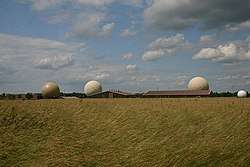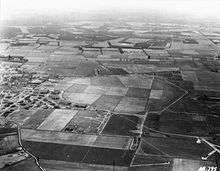RAF Feltwell
Royal Air Force Feltwell or more simply RAF Feltwell is a Royal Air Force station in Norfolk, East Anglia that is used by the United States Air Forces in Europe – Air Forces Africa. The station is located about 10 miles west of Thetford, and is in the borough of King's Lynn at approximate Ordnance Survey grid reference TL 715 900.
RAF Feltwell | |||||||
|---|---|---|---|---|---|---|---|
| Part of Air Combat Command (ACC) | |||||||
| Near Feltwell, Norfolk in England | |||||||
 Radomes at RAF Feltwell. | |||||||
 RAF Feltwell Shown within Norfolk | |||||||
| Coordinates | 52°28′46″N 000°31′09″E | ||||||
| Type | RAF station (US Visiting Forces) | ||||||
| Area | 137 hectares (340 acres)[1] | ||||||
| Site information | |||||||
| Owner | Ministry of Defence | ||||||
| Operator | United States Air Force | ||||||
| Controlled by | Twenty-Fifth Air Force | ||||||
| Condition | Operational | ||||||
| Site history | |||||||
| Built | 1936 | ||||||
| In use | 1937–1966 (Royal Air Force) 1960s – present (US Air Force) | ||||||
| Garrison information | |||||||
| Garrison | 544th Intelligence, Surveillance and Reconnaissance Group | ||||||
| Occupants | 18th Intelligence Squadron (Detachment 4) | ||||||
| Airfield information | |||||||
| Elevation | 16 metres (52 ft) AMSL | ||||||
| |||||||
| Notes: Flying ceased in the 1960s. | |||||||
A former Second World War bomber station, the airfield is used as a housing estate for United States Air Force personnel stationed nearby at RAF Mildenhall as part of the 100th Air Refueling Wing and RAF Lakenheath as part of the 48th Fighter Wing, while also containing the Mathies Airman Leadership School for USAF personnel in the UK, as well as being the home of the Army and Air Force Exchange Service's sole furniture store in the country. It also houses the only Middle school for Lakenheath and Mildenhall, which covers most of the station.
History
Royal Air Force use

The airfield was built during the period of expansion of the RAF in the late 1930s and is similar in layout to many of the other RAF airfields of the period (for example RAF Marham, RAF Watton and RAF West Raynham). The airfield was home to a number of heavy bomber squadrons of the RAF during the Second World War. Post war RAF Thor Missiles were stationed here 1958-1963. After the departure of the Thor missiles in 1963, the RAF's Officer Cadet Training Unit was based on the station, transferring from RAF Jurby, Isle of Man, in September 1963.[2]
Units;
- No. 37 Squadron RAF[3] (1937–1940) - Handley Page Harrow, Vickers Wellington I
- No. 57 Squadron RAF[3] (1940–1942) - Vickers Wellington I
- No. 75 Squadron RAF[3] (1940–1942) - Vickers Wellington I
- No. 77 Squadron RAF[3] (1958–1963) - Thor IRBM and the USAF 672d Technical Training Squadron and 99th Munitions Maintenance Squadron
- No. 192 Squadron RAF[3] (1943) - Handley Page Halifax II & V
- No. 214 Squadron RAF[3] (1937–1939) - Handley Page Harrow, Vickers Wellington I
- No. 464 Squadron RAAF[3] (1942) - Lockheed Ventura I & II
- No. 487 Squadron RNZAF[3] (1942–1943) - Lockheed Ventura I & II
- No. 651 Squadron RAF[3] (1955–1957) - Auster AOP6
- No. 3 Lancaster Finishing School[3] (1943–1945) - Avro Lancaster
- No. 3 Flying Training School RAF[3]
- No. 3 Service Flying Training School RAF[3]
- No. 7 TD Station[3]
- No. 20 Heavy Glider Maintenance Section[3]
- No. 76 (Bomber) Wing RAF[3]
- No. 1519 (Beam Approach Training) Flight RAF[3]
- No. 2724 Squadron RAF Regiment[3]
- No. 2736 Squadron RAF Regiment[3]
- Bomber Command Radar School[3]
- Bomber Command Strategic Missile School[3]
- Bombing Development Unit[3]
- Central Bomber Establishment[3]
- Gee-H Training Flight[3]
- Midland Area Flying Instructors School[3]
- New Zealand Flight[3]
- Northern Area Flying Instructors School[3]
- Radio Training Squadron[3]
- RAF Officer Cadet Training Unit[3]
- School of Instructional Technique[3]
United States Air Force use
Between 1989 and 2003 it also hosted the US Air Force's 5th Space Surveillance Squadron (5 SPSS) which was subordinate to the 21st Operations Group (21 OG) and the 21st Space Wing (21 SW), both at Peterson AFB, Colorado. These organisations in turn are subordinate to the 14th Air Force (14 AF) at Vandenberg AFB, California which reports to HQ Air Force Space Command (AFSPC), also at Peterson AFB, CO.
The 5 SPSS (initially designated "Detachment 1, 73rd Space Surveillance Group", or "Det 1 SSURGP") was part of the USAF's Passive Space Surveillance Network which tracked the physical location of emitting satellites in orbit. This data along with that from other systems was used to adjust the orbits of various satellites and manned vessels (for instance the Space Shuttle and the International Space Station) to reduce the risk of on-orbit collisions.
However other USAF systems and capabilities ultimately superseded DSTS and it was removed in 2002 and the unit was de-activated shortly thereafter. The 21st Space Wing now has a detachment at RAF Fylingdales, UK, to coordinate cooperative missile warning and space surveillance with RAF counterparts.
RAF Feltwell is now administered by Detachment 4 of the 18th Intelligence Squadron, which is a space control intelligence organization of the United States Air Force, located at Wright-Patterson AFB, Ohio and which has one other geographically separated detachments: Detachment 2, Osan AB, Korea.[4]
See also
- List of Royal Air Force stations
- United States Air Forces in Europe
- United States Air Force in the United Kingdom
References
- "Defence Estates Development Plan 2009 – Annex A". GOV.UK. Ministry of Defence. 3 July 2009. p. 15. Retrieved 6 May 2019.
- http://www.abct.org.uk/airfields/airfield-finder/jurby/
- "Feltwell". Airfields of Britain Conservation Trust. Retrieved 12 April 2020.
- Richelson, Jeffrey. The United States Intelligence Community, 3rd edition
External links
| Wikimedia Commons has media related to RAF Feltwell. |
.png)